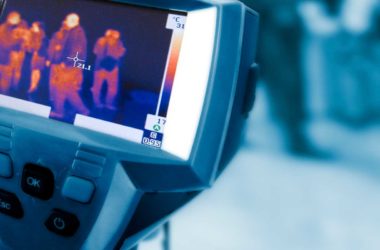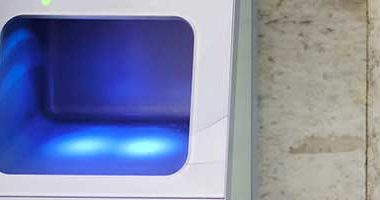OMRON has contributed, with the non-profit association TheOpenVentilator, to the development of an emergency ventilator for compassionate-use, built with quality equipment and industrial reliability, to help patients requiring mechanical ventilation due to COVID-19.
From the various projects presented to the Spanish Ministry of Health, TheOpenVentilator project that originated from the youth science program Celera in Spain, has been the first to be approved by the Spanish Electrical Engineering Official Central Laboratory (LCOE), regulated by the Spanish Agency of Medicines and Medical Products. The ventilator is similar to devices already available and can be approved for CE marking once the pandemic has been overcome.
The project has been carried out in record time thanks to funding from Mapfre Foundation, the support of the Community of Madrid, the Rey Juan Carlos University, and a broad business consortium.
High-capacity ventilator for intensive use
The ventilator was developed in less than two weeks by TheOpenVentilator thanks to considerable R&D efforts, and is already being tested with patients in a clinical trial for compassionate use at Hospital de Alcorcón in Madrid and Vall d´Hebron in Barcelona. In addition, it has shown its ability to withstand intensive use with the necessary medical parameters to safeguard the health of the patients affected by COVID-19.
The device is similar to commercial ventilators already available, and more advanced than the ones used these days as an emergency solution in field hospitals. The device includes a machine learning feature that allows it to learn and adjust its performance to medical needs in real time.
Mass production will be possible at significantly lower cost than current ventilators on the market. This is due to the collaboration of a consortium of companies that have shared facilities, staff and components in Madrid and Barcelona. Among them, OMRON has contributed by sharing expertise on electronic equipment for the healthcare industry, along with Fabrez, Igus and Finsa.
Mapfre Foundation’s role has been essential in funding the development and manufacture of the prototype. The first 50 devices will be donated by the Foundation to various hospitals in Spain.
The objective is to provide Spanish communities with a robust and functional device, aimed to help health workers save lives. For this purpose, Rey Juan Carlos University has taken part as well as a promoter of the project.
The process has also required solving a complex legal framework, from both business and medical points of view. In order to solve all legal queries, TheOpenVentilator has had the invaluable collaboration of the CECA MAGÁN Abogados law firm.

The first solution approved by the Spanish health authorities
“Our goal has been to create a solution, practically equivalent to commercial ventilators already approved, that can be trusted by medical specialists,” claims Javier Asensio, medical coordinator of TheOpenVentilator, and doctor at Hospital 12 de Octubre.
“It is not just a simple portable ventilator for a field hospital to get through the crisis”, adds Javier González, materials engineer and head of the project. “What we have achieved is a robust and functional device, at a very low cost and with scalable production capacity “.
With regards to other similar projects currently underway, Álvaro Gallego, product coordinator, states: “We do not see them as competitors, but rather as fundamental and intertwined projects in the fight against coronavirus for which we must join forces. We are convinced that TheOpenVentilator has one of the most complete and safe technical and medical capabilities. In fact, this has been the first equipment to be approved by the Spanish health authorities.”
Technical details and mass production capacity
OMRON’s role in the project is based on providing innovation and technological solutions for the benefit of society, with focus on design, development support, programming and the supply of the necessary electronic components for the ventilator. The ventilator is can be easily replicated with a robust design made with laser-cut mechanical parts in stainless steel, and industrial-grade electronic components that are both standardized and highly available.
The Sysmac Controller stands out thanks to its technical characteristics. It allows healthcare professionals to implement the most widely used ventilation modes in mainstream ventilators, by combining advanced process regulation and machine learning, which allows adapting the movements of the servo drive for the ventilation mechanism to meet the patient’s needs. It also includes a seven-inch screen that shows the air pressure and flow in real time. All these components are integrated into OMRON’s Sysmac Automation Platform that guarantees coordination between the different components.
The goal: help patients recovering from COVID-19
Raúl Nicolás, Robotics Solutions Engineer at OMRON Iberia states: “We are very proud of the R&D engineers, who have voluntarily taken part in the project. This is a crucial moment to demonstrate the harmony between companies, institutions and people. Our four colleagues have been working hard since the 23rd of March, day and night, in order to create the best possible ventilator to help the people who need it the most in this unprecedented health crisis.”
“We have done our best to provide the ventilator with the most suitable electronic components, following medical advice and making the production easier thanks to the best industrial technology available in the market”, Raúl Nicolás continues.
TheOpenVentilator has been successfully tested following all current regulations, including electrical safety and EMC controls, carried out by the LCOE, combined with the clinical trials at the hospitals in Spain. These will allow the mass production of the ventilator to start, ready to help patients and alleviate the lack of ventilators around the world.
Recommended products
NX Distributed I/O Modules Sysmac
NX series I/O covers a full range of units, including standard and high-speed digital I/O’s, analog I/O’s, encoder inputs, pulse outputs and safety control.

1S Servo Motors
Simplified machine design and maintenance. 23-bit resolution encoder, compact and small motor size, multi-turn encoder design without mechanics: 16-bit, 65536 turns, battery-free absolute multi-turn encoder or incremental encoder.

SYSMAC CJ-series Ethernet CPU Units
Supports Ladder Logic, Sequential Function Chart, Structured Text and Mnemonic programming, Supports structured programming using function blocks. Memory Cards can be installed.

NS series HMI Touch Panel
The NS-series HMIs provide the highest possible compatibility with the road-proven CS/CJ-series the highest new NJ-series Controllers to achieve even greater added value in user machines.












